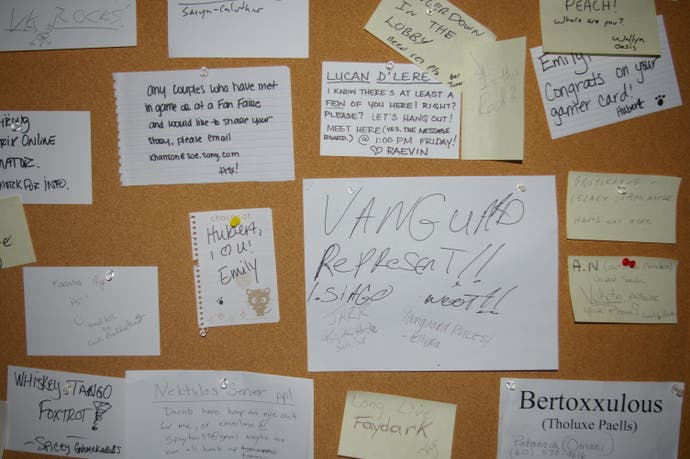Fear and Levelling in Las Vegas
Eurogamer goes gonzo at Sony Online Entertainment's Fan Faire.
Five steps away from DCUO, but strangely absent from any in-depth mention in Smedley's address, was The Agency, which continues to look gorgeous, but remains unplayable. A panel showcasing a video walkthrough suggested there was plenty of brains behind the beauty, however, with elements like a web-based client that allows you to manage your operatives when you're not logged in. "We're taking the best of the MMO space and combining it with the best of the shooter," announced development director Matt Wilson, who felt there was no danger in moving the genre outside of fantasy settings. "MMOs come with recognition: you know what a troll is. That's exactly why we chose espionage. People still know what to expect."
But the central push of both the Fan Faire and Smedley's address was, surprisingly, Free Realms. "It's designed from the ground up to be playable by people of all ages," said the executive. "This is exactly something that's missing from the marketplace."
Chunky, colourful, and deceptively simple, Free Realms may quietly be the most progressive and inventive MMO in development. A mix of social networking site and a virtual world, the comical trailer doesn't even mention MMOs once, but this is far from being a simple tweenaged Second Life: there's levelling, classes, and a massive mini-game-riddled map, with entirely optional combat. Somehow, the development team has managed to make all this launch from a browser, with an almost invisible client download. On top of that, it's free to play, with a 'velvet rope' payment model separating off certain paid areas and items.

In retooling the MMO structure for as wide an audience as possible, Free Realms' team has managed to make something that already feels pure and uncluttered. Do MMOs really need limited inventory slots and an early choice tying you into a class? This game suggests they don't, allowing you to carry as much as you want and switch classes simply by changing your outfit. As the game is aimed at children, the team is already planning a suite of safety features to stop this virtual funfair from becoming a predator's one-stop shop, thankfully without the need for sadistically unmemorable Friend Codes.
A game that encourages people to play MMOs with their families was a fitting highlight for a weekend that showed that people already do play MMOs with their families. With many questioning whether this type of experience is even a viable market in the first place, or just a playground for Blizzard and a few plucky stragglers swarming in its wake, SOE is a good place to look for some kind of an answer. After all, SOE used to be Blizzard, back when EverQuest was taking the audience into the unthinkable realms of the half-millions. It isn't on top anymore, and, in a brilliantly honest strategy, isn't trying to pretend that it is. Despite that, it has a decade of experience, a suite of profitable games, the money and vision to take risks, and an ever-widening portfolio that allows it to work around World of Warcraft, finding different audiences, rather than headbutt Blizzard directly - like Conan and Warhammer - gaining partial victories which will probably be wiped out whenever Azeroth welcomes a new expansion.

John Blakely, development chief at SOE Austin (where DC Universe and Star Wars Galaxies are made), summed up the company's approach best when he told me, "When we started, we had EverQuest, which was a fairly traditional, hardcore, very difficult game. EQII fills a slightly different role, as does PlanetSide, and all of our games address a different market segment. Now, you're seeing us grow up with our fans, and we're branching out as they are."
It was hard to leave Fan Faire, then, with anything other than the feeling that SOE has put some seriously effective thinking into where to take its fans next. When the last night rolled around, and the cosplayers eventually turned up in force, the picture was finally complete: as secret agents shared the stage with tubby barbarians, the future of MMOs met up with their past, and, for one long evening, neither looked out of place.
